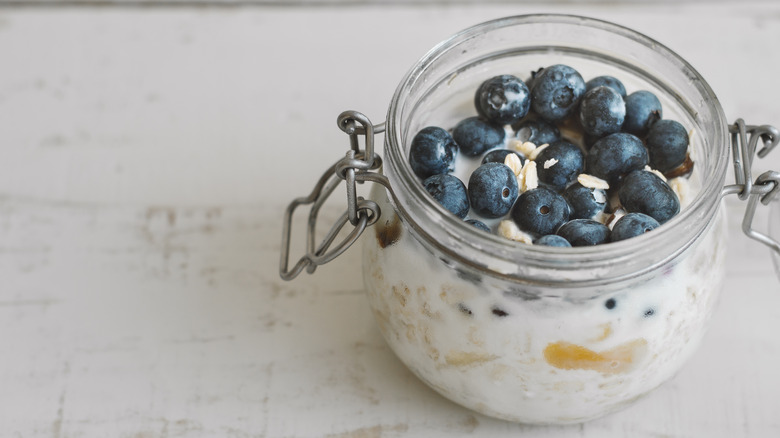Why You Shouldn't Prep Overnight Oats Too Far In Advance
Overnight oats have become the easy answer to starting mornings with something more nutritious than a greasy baked good picked up quickly from the convenience store. Determined meal-preppers worldwide are storing oats in the fridge, anticipating hurried mornings that don't allow time for watching oats cook slowly on the kitchen stove. Bob's Red Mill believes the convenience, ease, affordability, and flexibility of overnight oats have made the recipe popular.
Instagram is filled with over one million picturesque presentations of the beloved breakfast dish with tips on creating photo-worthy bowls of chia seeds, fruits, and oats containing dessert-like textures. Although overnight oats are generally simple to prepare, there are a few precautions to take to ensure their success. Preparing overnight oats with care will ensure that they are delicious, safe to eat, and properly stored — because even simple recipes have expiry dates.
Plan ahead – but not too far
Eat This, Not That! advises that overnight oats can be made up to four days in advance. The longer your oats sit in the fridge, the soggier they will become. If you like a particularly smooth and creamy texture, inspect the oats before digging in. Foods Guy warns that oats made with milk have a better chance of going bad. Consider using almond milk for longer life. Toss the oats if you notice mold, smell anything foul, or see discolored spots in the oatmeal.
If you do anticipate storing oats for longer than five days, you can keep them in mason jars in the freezer for up to six months. Kitchn adds that toppings like nuts and berries can be held off until you're ready to eat, as they can result in a softer, wetter consistency. You may also need to give the ingredients an extra stir to reintroduce them to one another. For the perfect bite, we maintain overnight oats are appropriately named – and best eaten a day or two after preparation.

